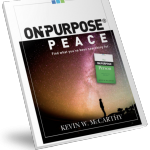What is change management’s greatest failure?
I am a contrarian about change management. It is just plain sloppy, imprecise language by the manager to describe a process and not an end result. The strategic work and a meaningful communication and action plan are missing. In the end change management invariably whips the corporate culture into a phase of unneeded confusion resulting in lost productivity and broken momentum.
There is a better way—growth management!
Change management is too often the latest in a line of misguided management marketing ploys to justify their efforts and position themselves to employees and shareholders as being on top of the business when they’re not. The employees know better and the shareholders are too distant to recognize the deficit of details being sold to them as strategy and leadership.
Change management is used at every level in organizations where two or more persons form a team. Supervisors to CEOs use the word “change” as a subtle form of control. Change management is a “wonderfully” accepted and euphemistic term in the general management business community for “a bunch of people (but not me) are going to pay a price for what’s getting ready to happen in this company.” Change managers use a variety of terms to disguise the stark reality that they are imposing their will upon their team and the consequences will fall upon the team.
Per Wikipedia, the definition of change management is “… any approach to transitioning individuals using methods intended to redirect the use of resources, business process, budget allocations, or other modes of operation that significantly reshape a company or organization.”
True translation:
Change = everyone else is going to accommodate what the change agent is saying and that person is just trying to figure out a way to break the bad news to you but doesn’t have the guts to speak plainly.
Amazingly, change management is the name of courses in business schools with professors and degrees focused on it. Major consulting firms have entire practice areas focused on it. Yet it remains a misdirection and distraction to the health and well-being of organizations.
As a business person or business leader, change is a word that you need to take as a warning to your own management approach. When you talk about change, it means the leader is either unclear about his or her vision or is unwilling to state it clearly. The subjects of the change, who are often far too trusting or at risk of challenging, will eventually learn whether the change was for good or for bad.
Regardless of the venue, leaders who market “change management” are as laughable as the emperor’s new wardrobe. The “beauty” of change is that it offers no measurable result, direction, or accountability.
Change can be negative or positive.
It just means something will be different, period. Well, of course, something will be different. Don’t settle with change—clarify what it means and where it is leading. Know the direction. Understand the destination.
Change is blind strategy with an escape clause for the change agent but rarely for the recipients of change. In reality, expect decline unless luck prevails!
The Power Option: Growth Management
Change is risky business. Few of us like change. Yet change, like breathing, is a fact of life.
Instead of change, let’s make the standard one of growth management.
Now the business person (or CEO) is focused in an upward direction and has a measurable result with a charge to add value instead of an ill-defined, open-ended nothing strategy that’s likely to result in decay rather than in growth. Decay is easy—do nothing. Growth, however, requires rolling up one’s sleeves, yanking out the weeds, and nourishing what’s discerned and defined as desirable.
Growth can include profits, behavior, people, relationships, and morale. Change is ultimately unaccountable babble left to the discretion of the leader making the change and an empty vision. It may sound inspiring, but it is merely sleight of hand illusion.
Growth requires a proactive partnership of time, money, talent, and a host of other factors coming together to a common cause. Growth is still a broad term that, like beauty, is in the eye of the beholder. It does, however, call forth cooperation, effort, and something of a more positive and productive nature on the personal, professional, and organizational levels.
Here’s a simple example. Pretend your boss walks in and says, “Let’s talk about a change I’m making to your paycheck.” What’s your response? You’re sure a pay cut is coming. You anticipate that your job or territory is getting ready to be reduced or eliminated. Am I right?
Now let’s imagine your boss walks in this time and says, “Let’s talk about a growth I’m making to your paycheck.” Growth has replaced change. Now assuming your pay stub doesn’t have a tumor, in the second example, you’re getting engaged and excited because your boss is communicating that plans are in process for a raise and an explanation for your coming reward. Economic growth and development trump economic change (and decay).
The mere act of replacing one word makes all the difference. Change is an implied downer. Growth is an exciter.
My suggestion: only use the word change when describing what’s in your pocket after buying your Chick-fil-a lunch any day of the week except Sunday. Change is apropos when reporting on the past. It is not a strategy for the future. Be in the business of growth and you will more likely be on-purpose.
Learn more about how to strategically and effectively create a pathway for growth management and value creation. Watch The On-Purpose Business Plan 9-minute instructional video.




